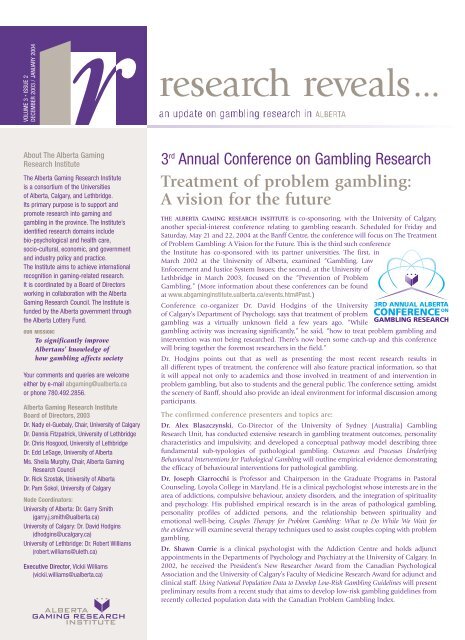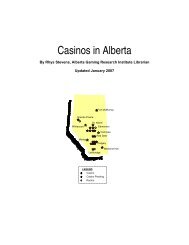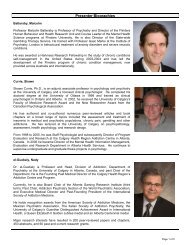Issue 2, Volume 3 - Dec 2003 / Jan 2004 - Alberta Gambling ...
Issue 2, Volume 3 - Dec 2003 / Jan 2004 - Alberta Gambling ...
Issue 2, Volume 3 - Dec 2003 / Jan 2004 - Alberta Gambling ...
Create successful ePaper yourself
Turn your PDF publications into a flip-book with our unique Google optimized e-Paper software.
VOLUME 3 • ISSUE 2<br />
DECEMBER <strong>2003</strong> / JANUARY <strong>2004</strong><br />
About The <strong>Alberta</strong> Gaming<br />
Research Institute<br />
The <strong>Alberta</strong> Gaming Research Institute<br />
is a consortium of the Universities<br />
of <strong>Alberta</strong>, Calgary, and Lethbridge.<br />
Its primary purpose is to support and<br />
promote research into gaming and<br />
gambling in the province. The Institute’s<br />
identified research domains include<br />
bio-psychological and health care,<br />
socio-cultural, economic, and government<br />
and industry policy and practice.<br />
The Institute aims to achieve international<br />
recognition in gaming-related research.<br />
It is coordinated by a Board of Directors<br />
working in collaboration with the <strong>Alberta</strong><br />
Gaming Research Council. The Institute is<br />
funded by the <strong>Alberta</strong> government through<br />
the <strong>Alberta</strong> Lottery Fund.<br />
OUR MISSION:<br />
To significantly improve<br />
<strong>Alberta</strong>ns’ knowledge of<br />
how gambling affects society<br />
Your comments and queries are welcome<br />
either by e-mail abgaming@ualberta.ca<br />
or phone 780.492.2856.<br />
<strong>Alberta</strong> Gaming Research Institute<br />
Board of Directors, <strong>2003</strong><br />
Dr. Nady el-Guebaly, Chair, University of Calgary<br />
Dr. Dennis Fitzpatrick, University of Lethbridge<br />
Dr. Chris Hosgood, University of Lethbridge<br />
Dr. Edd LeSage, University of <strong>Alberta</strong><br />
Ms. Sheila Murphy, Chair, <strong>Alberta</strong> Gaming<br />
Research Council<br />
Dr. Rick Szostak, University of <strong>Alberta</strong><br />
Dr. Pam Sokol, University of Calgary<br />
Node Coordinators:<br />
University of <strong>Alberta</strong>: Dr. Garry Smith<br />
(garry.j.smith@ualberta.ca)<br />
University of Calgary: Dr. David Hodgins<br />
(dhodgins@ucalgary.ca)<br />
University of Lethbridge: Dr. Robert Williams<br />
(robert.williams@uleth.ca)<br />
Executive Director,Vickii Williams<br />
(vickii.williams@ualberta.ca)<br />
3 rd Annual Conference on <strong>Gambling</strong> Research<br />
Treatment of problem gambling:<br />
A vision for the future<br />
THE ALBERTA GAMING RESEARCH INSTITUTE is co-sponsoring, with the University of Calgary,<br />
another special-interest conference relating to gambling research. Scheduled for Friday and<br />
Saturday, May 21 and 22, <strong>2004</strong> at the Banff Centre, the conference will focus on The Treatment<br />
of Problem <strong>Gambling</strong>: A Vision for the Future. This is the third such conference<br />
the Institute has co-sponsored with its partner universities. The first, in<br />
March 2002 at the University of <strong>Alberta</strong>, examined “<strong>Gambling</strong>, Law<br />
Enforcement and Justice System <strong>Issue</strong>s; the second, at the University of<br />
Lethbridge in March <strong>2003</strong>, focused on the “Prevention of Problem<br />
<strong>Gambling</strong>.” (More information about these conferences can be found<br />
at www.abgaminginstitute.ualberta.ca/events.htm#Past.)<br />
Conference co-organizer Dr. David Hodgins of the University<br />
of Calgary’s Department of Psychology, says that treatment of problem<br />
gambling was a virtually unknown field a few years ago. “While<br />
gambling activity was increasing significantly,” he said, “how to treat problem gambling and<br />
intervention was not being researched. There’s now been some catch-up and this conference<br />
will bring together the foremost researchers in the field.”<br />
Dr. Hodgins points out that as well as presenting the most recent research results in<br />
all different types of treatment, the conference will also feature practical information, so that<br />
it will appeal not only to academics and those involved in treatment of and intervention in<br />
problem gambling, but also to students and the general public. The conference setting, amidst<br />
the scenery of Banff, should also provide an ideal environment for informal discussion among<br />
participants.<br />
The confirmed conference presenters and topics are:<br />
Dr. Alex Blaszczynski, Co-Director of the University of Sydney (Australia) <strong>Gambling</strong><br />
Research Unit, has conducted extensive research in gambling treatment outcomes, personality<br />
characteristics and impulsivity, and developed a conceptual pathway model describing three<br />
fundamental sub-typologies of pathological gambling. Outcomes and Processes Underlying<br />
Behavioural Interventions for Pathological <strong>Gambling</strong> will outline empirical evidence demonstrating<br />
the efficacy of behavioural interventions for pathological gambling.<br />
Dr. Joseph Ciarrocchi is Professor and Chairperson in the Graduate Programs in Pastoral<br />
Counseling, Loyola College in Maryland. He is a clinical psychologist whose interests are in the<br />
area of addictions, compulsive behaviour, anxiety disorders, and the integration of spirituality<br />
and psychology. His published empirical research is in the areas of pathological gambling,<br />
personality profiles of addicted persons, and the relationship between spirituality and<br />
emotional well-being. Couples Therapy for Problem <strong>Gambling</strong>: What to Do While We Wait for<br />
the evidence will examine several therapy techniques used to assist couples coping with problem<br />
gambling.<br />
Dr. Shawn Currie is a clinical psychologist with the Addiction Centre and holds adjunct<br />
appointments in the Departments of Psychology and Psychiatry at the University of Calgary. In<br />
2002, he received the President’s New Researcher Award from the Canadian Psychological<br />
Association and the University of Calgary’s Faculty of Medicine Research Award for adjunct and<br />
clinical staff. Using National Population Data to Develop Low-Risk <strong>Gambling</strong> Guidelines will present<br />
preliminary results from a recent study that aims to develop low-risk gambling guidelines from<br />
recently collected population data with the Canadian Problem <strong>Gambling</strong> Index.
Dr. Jeffrey L. Derevensky holds joint appointments in the Departments of Educational<br />
and Counselling Psychology; Psychiatry; and Community Dentistry at McGill University. He is<br />
Co-Director of the McGill University Youth <strong>Gambling</strong> Research & Treatment Clinic and its<br />
International Centre for Youth <strong>Gambling</strong> Problems and High-Risk Behaviours. Youth <strong>Gambling</strong><br />
Problems: From Research to Treatment will examine current research findings designed to identify<br />
the correlates and risk factors associated with youth gambling problems.<br />
Dr. David Hodgins is a Professor, Department of Psychology, University of Calgary with an<br />
adjunct appointment in its Faculty of Medicine. He is also a practicing clinical psychologist. Since<br />
1996 he has been interested in the process of recovery from gambling problems and has received<br />
research grants from several different agencies for his work. Brief Treatment Models: Promoting the<br />
Self-Recovery Process, will discuss the ways in which brief motivational interventions can be used<br />
to extend the number of treatment options for problem gamblers and their families. Programs<br />
will be described and results from evaluations of<br />
Conference speakers have provided the following<br />
citations relating to their presentations:<br />
• Blaszczynski, A. & Nower, L (2002). A pathways<br />
model of problem and pathological gambling.<br />
Addiction, 97, 487-499.<br />
• Carriocchi, Joseph (2002) Counseling Problem<br />
Gamblers: A Self-regulation Manual for Individual<br />
and Family Therapy. New York: Academic Press.<br />
• Currie, S., Clark, S., Rimac, S., & Malhotra, S.<br />
(<strong>2003</strong>). Comprehensive assessment of insomnia in<br />
recovering alcoholics using daily sleep diaries and<br />
ambulatory monitoring. Alcoholism: Clinical and<br />
Experimental Research, 27, 1262-1270.<br />
• Derevensky, J., Gupta, R., & Winters, K. (<strong>2003</strong>).<br />
Prevalence rates of youth gambling<br />
problems: Are the current rates inflated Journal<br />
of <strong>Gambling</strong> Studies, 19, 405-425.<br />
• Grant, J. E., Kim, S.W., & Potenza, M.N. (<strong>2003</strong>).<br />
Advances in the pharmacological treatment<br />
of pathological gambling. Journal of <strong>Gambling</strong><br />
Studies, 19,85-109.<br />
• Gupta, R., & Derevensky, J. L. (2000). Adolescents<br />
with gambling problems: From research to treatment.<br />
Journal of <strong>Gambling</strong> Studies, 16, 315-342.<br />
• Hodgins, D. C., Currie, S. & el-Guebaly, N. (2001).<br />
Motivational enhancement and self-help treatments<br />
for problem gambling. Journal of Consulting and<br />
Clinical Psychology, 69, 50-57.<br />
• Ladouceur, R., Sylvain, C., Boutin, C., Doucet, C.<br />
(2002). Understanding and treating<br />
pathological gamblers. London: Wiley.<br />
• McConaghy, N., Blaszczynski, A. & Frankova, A.<br />
(1991). Comparison of imaginal desensitisation<br />
with other behavioural treatments of pathological<br />
gambling: A two to nine year follow-up. British<br />
Journal of Psychiatry, 159, 390-393.<br />
• Rugle, L. (1993). Initial thoughts on viewing<br />
pathological gambling from a physiological and<br />
intrapsychic perspective. Journal of <strong>Gambling</strong><br />
Studies, 9, 3-16.<br />
•Potenza, M. N., Fiellin, D. A., Heninger, G. R.,<br />
Rounsaville, B. J., & Mazure, C. M. (2002).<br />
<strong>Gambling</strong>: An addictive behavior with health<br />
and primary care implications. Journal of General<br />
Internal Medicine, 17, 721-732.<br />
• Stinchfield, R. & Winters, K. C. (2001). Outcome<br />
of Minnesota’s <strong>Gambling</strong> Treatment Programs.<br />
Journal of <strong>Gambling</strong> Studies, 17, 217-245.<br />
their effectiveness will be presented.<br />
Dr. Robert Ladouceur is a Professor of<br />
Psychology at Laval University in Quebec City.<br />
He has pioneered work in cognitive treatment of<br />
gambling. Cognitive and Behavioural Treatment<br />
of Problem Gamblers: Active Components and Goals<br />
will review the main outcomes and treatment<br />
components. Abstinence versus control will be<br />
discussed in the context of reducing dropouts.<br />
Dr. Loreen Rugle has worked in the problem<br />
gambling field since 1985. She is Clinical/<br />
Research Director for Trimeridian, Inc., and previously<br />
was Deputy Director of the Veterans<br />
Addiction Recovery Center in Brecksville, Ohio.<br />
‘Multi-modal’ Treatment for Problem <strong>Gambling</strong> and<br />
Ways of Knowing: A Synergistic Approach will<br />
discuss development of a model for comprehensive<br />
“evidenced-based” problem gambling treatment<br />
that integrates empirically derived data with<br />
clinical experience.<br />
Dr. Marc N. Potenza, Assistant Professor of<br />
Psychiatry at the Yale University School of<br />
Medicine, specializes in Addiction Psychiatry.<br />
He is Director of the Problem <strong>Gambling</strong> Clinic<br />
and Director of the Women and Addictions<br />
Core of Women’s Health Research at Yale.<br />
Evidence-Based Pharmacotherapies for Pathological<br />
<strong>Gambling</strong>: Translating Neurobiological Findings into<br />
Treatment Advances will present a current model<br />
for understanding pathological gambling, which<br />
will in turn provide a platform for describing<br />
current evidence-based treatments for pathological<br />
gambling.<br />
Dr. Randy Stinchfield is a Clinical Psychologist<br />
and Associate Director, Center for Adolescent<br />
Substance Abuse Research at the University of<br />
Minnesota Medical School. He is currently<br />
studying the reliability and validity of the<br />
<strong>Gambling</strong> Treatment Outcome Monitoring<br />
System (GAMTOMS). <strong>Gambling</strong> Treatment<br />
Outcomes and Measuring Outcome with the<br />
<strong>Gambling</strong> Treatment Outcome Monitoring System<br />
(GAMTOMS) will focus on a review of recent<br />
gambling treatment outcome studies and will<br />
describe the GAMTONS, including reliability,<br />
validity, and methods of measuring treatment<br />
outcome.<br />
The Conference will also include poster presentations<br />
and workshops. For further information<br />
and registration forms, see www.abgaminginstitute.<br />
ualberta.ca/Events/<strong>2004</strong>_Conference/.<br />
www.abgaminginstitute.ualberta.ca<br />
Call for Poster<br />
Submissions<br />
The Conference Committee invites poster<br />
submissions of recent empirical research<br />
for presentation. Please submit a 200 word<br />
abstract in electronic format (MS-Word<br />
preferred) to Dr. David Hodgins,<br />
dhodgins@ucalgary.ca. Abstracts should<br />
include: title of research, names of authors<br />
with the presenting author underlined, and<br />
author affiliation and contact information.<br />
Submission deadline is March 17, <strong>2004</strong><br />
(with peer review process and decision<br />
completed by March 31). All poster<br />
presenters must register for the conference.<br />
<strong>2003</strong> Honourary Izaak<br />
Walton Killam Memorial<br />
Scholarship<br />
Katherine Diskin, currently a doctoral<br />
student in psychology at the University<br />
of Calgary, has won this prestigious award<br />
for her research into the effects of a single<br />
motivational intervention on problem<br />
gambling behaviour. Killam Pre-Doctoral<br />
Scholarships are awarded to doctoral<br />
students of outstanding calibre. She adds<br />
this to her Social Sciences and Humanities<br />
Research Council Doctoral Fellowship,<br />
<strong>Alberta</strong> Heritage Foundation for Medical<br />
Research Award, and National Council on<br />
Problem <strong>Gambling</strong> Award (2000) for best<br />
master's thesis.<br />
Vickii Williams Executive Director<br />
davidnorwood-ink Writer/Editor<br />
Epigrafix<br />
Design/Layout<br />
Garry Smith Media contact 780.492.2770<br />
e-mail: abgaming@ualberta.ca p: 780.492.2856<br />
ISSN 1499-2639 (Print) ®<br />
AGRI <strong>2003</strong><br />
ISSN 1499-2647 (Online)






